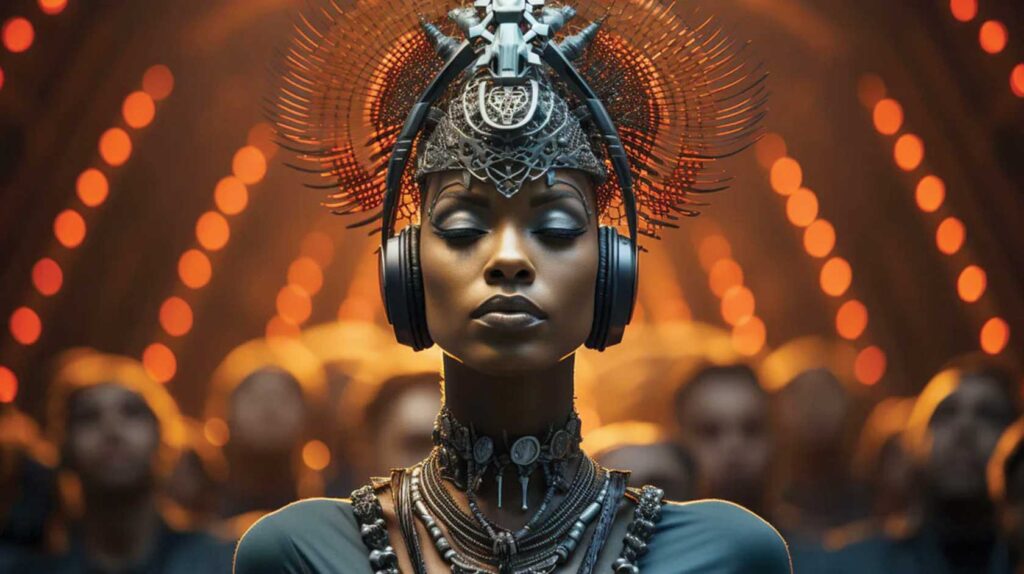
Photo courtesy of CultureBay.co.
This story is part of “Black to the Future,” a series that examines how Afrofuturism pushes us to imagine and create a world where people of African descent thrive.
As the discourse around Afrofuturism gains momentum, fueled by the visionary works of Octavia Butler and contemporaries like Questlove, Janelle Monae, and all things Wakanda, a necessary dialogue is unfolding about the need for the futuristic movement in educational spaces.
Sam P.K. Collins, staff writer for The Washington Informer and a gifted teacher and writing workshop instructor, underscores the urgency for both the young and the old in the Black community to embrace the idea of Black people existing in realms not just of our present reality but in new and innovative worlds.
“Afrofuturism, for all intents and purposes, is what Rastafari people call Ancient Future,” Collins tells Word In Black. “It is the past and the present, and the future where there’s always a chance for renewal and regurgitation.”
Embedding Afrofuturism into the curriculum
In an era marked by the banning of books by Black authors or about Black history, and where the implementation of AP African American Studies courses sparks resistance and controversy, establishing educational sanctuaries with the sole intent of filling in the gaps is crucial, Collins says. And creating learning spaces that embrace and amplify Blackness — and a Black future — is a visionary and revolutionary act.
We need “separation in the sense that we need our own institutions anyway,” Collins says.
“Any attempt within the system that’s not yours can be futile,” he explains. For those who make the attempt to educate children with an Afrocentric future in mind, Collins has practical advice: “I would just suggest that they start with current events.”
One way to introduce the topic to students of all ages is to look at the influence of African cultures as they connect to the past, present and future cultures.
The African American Intellectual History Society suggests textbooks like “Conjuring Worlds: An Afrofuturist Textbook for Middle and High School Students” by B. Sharise Moore. Moore aims to connect “curriculum and Afrofuturism to create a one-of-a-kind textbook that would feature some of the best writers and artists the genre had to offer.”
“They start with contemporary culture, and they use that as a pathway to introduce Afrofuturism and assess,” Collins says. “Analyze the culture and the current events that can allow them to delve deeper into the origins and analyze how ancient African culture shows up time and time again in the present.”
Making Afrofuturism a lived reality
Beyond the confines of the classroom, Collins says integrating conversations, literature and film about Afrofuturism into day-to-day life is part of the work parents have to do if we want Black children to be healthy and whole.
For example, an Afrofuturist program through the American Alliance of Museums introduced a program where young people explore topics on “ancestral wisdom, cultural knowledge, and the plausible thought that resiliency is the answer.”
“Parents got to embody it,” Collins says. “They have to institutionalize reading time. Not enough to just tell your children to read a book. Turn the TV off — or if you’re going to turn on the TV, have some dialogue during the show, engage them in discussion.”
And it’s crucial to start early.
“The first seven years of any child’s life, or the formative years, that’s when you instill values,” Collins says, like envisioning thriving Black bodies in utopian spaces that feel like Wakanda.
Collins adds that it’s worth taking the time to find authors and literature that align with the Black experiences and values, so students fall in love with themselves and books.
“It’s incumbent upon parents to create that lifestyle for their children, be the example that they want them to be,” Collins says. “Go to public libraries, go to shows, festivals — again, engage them in discussions, ask them open-ended questions. Instill vocabulary in them, make reading more something that they can take on as an interest, rather than something that they have to do.”
This article was originally posted on WordInBlack.com.






